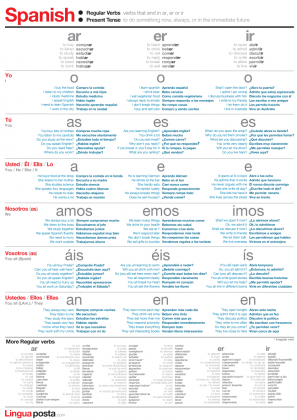

Spanish in Argentina has a little change when it comes to the conjugation of the second person singular (the informal you).

Se cayeron a chingadazos en la escuela: They started a bad fight at school.Alguien me dio un madrazo en la cabeza: Someone hit me on the head.They could be caused by an object, a person, or the result of a crash. Two curse words are often used to describe violent impacts. Vete a la verga o te voy a partir la madre: Beat it or I’m going to kick your ass.Estoy hasta la madre de tareas: I have too many tasks.Estoy hasta la madre de que me mientas: I’m sick and tired of your lies.Often used by Spanish speakers when they can’t take any more bullshit: However, if you are “encabronado”, it means you are actually pretty angry. By the way, a non-vulgar expression for this would be “está cañón”. If the situation is fucked up hard, then you can say “está cabrón”. You could also say that this and culero are good replacements for saying asshole in Spanish. It’s only acceptably harmless when your buddies call you this way. Instead, it’s a pretty strong insult meaning “fucker” or “sucker”. If someone tells you this, it’s not implying you look like a goat as the literal translation would refer. Apaga la luz, no seas culero: Turn off the light, don’t be a coward.Este pinche culero me quiere hacer trampa: This fucker wants to cheat.Given the situation, it could be a bad-intentioned or cowardly person. La pinche lluvia me chingó los planes: The fucking rain ruined my plans.Ese pinche chamaco no deja de chingar: That fucking brat is a pain in the ass.Īs it could be taken as “fucking” in English, you can put it everywhere.People put it in front of an insult so it increases its efficacy. More than meant to be a direct insult, this word is something like an intensifier used in Mexico. Some people would consider it rude or vulgar, so employ it with friends. La comida está bien chingona: The food is very good.Įven though the term is quite common, it is not suitable for formal situations.Carlos es un chingón en física: Carlos is very good at physics.When using “chingón” we talk about the best option: On the other hand, we have “chingón” which is related to “chido” which is something good. Tengo un chingo de cosas por hacer: I have a lot of things to do.Estuve chingándole todo el día: I worked the whole day.¡Deja de chingar, cabrón!: Stop bothering, you ass!.We can also have this word as a verb chingar, similar to fuck, can be expressed in multiple scenarios.Īccording to the context, it could mean “to annoy”, “to have heavy work” or maybe “to have a lot to do” : Esto está de la chingada: This is not good.Chingada could be a deplorable place, state, or condition.

Now, due to its malleability, you’ll have to be careful not to send the wrong message. Originally from Mexico, chingada is now usually used everywhere in Latin America for memes and everyone loves it. Unlike the previous one, Spanish curse words using chingar are pretty vulgar.

No te hagas el pendejo: Don’t try to play the fool.Órale, mijo, estás bien pendejo: Geez, son, you’re so stupid.There is also the possibility of you acting as such. It’s widely used with people who are not considered to be so smart. It meant “pubic hair” before but not anymore. It’s the first word that people from the United States learn from Mexicans in Spanish. Culo: ass curse referring to that part of the body.De puta madre: Something very good or bad depending on the tone.Well, the last two have two words but they go together and people pronounce those as one. Chúpamelo or Chúpamela: suck my dick or pussy.Hijo de puta: son of a bitch is a very common and effective Spanish curse.Now you are talking nasty! Use these wisely. Tonto del culo: idiot of the ass? No, it is used to curse someone extremely stupid.¡La madre que te parió!: Damn the mother who bore you!.Use them whenever you hit yourself with something or some situation doesn’t go as expected. The basics to start our cursing course! There are some phrases or just words in Spanish that everyone uses for which, no matter the place, the meaning doesn’t change or they have a very similar interpretation. So, let’s review the terms they use in the most visited Spanish-speaking countries but first, let’s look at what we can call international swear words. Not all Spanish curse words have the same meanings, it depends on the country in which they are used. As should happen in every culture, curse words relieve stress or anger. Well, definitely not with strangers or, at least, not in front of them if you want to avoid trouble.


 0 kommentar(er)
0 kommentar(er)
